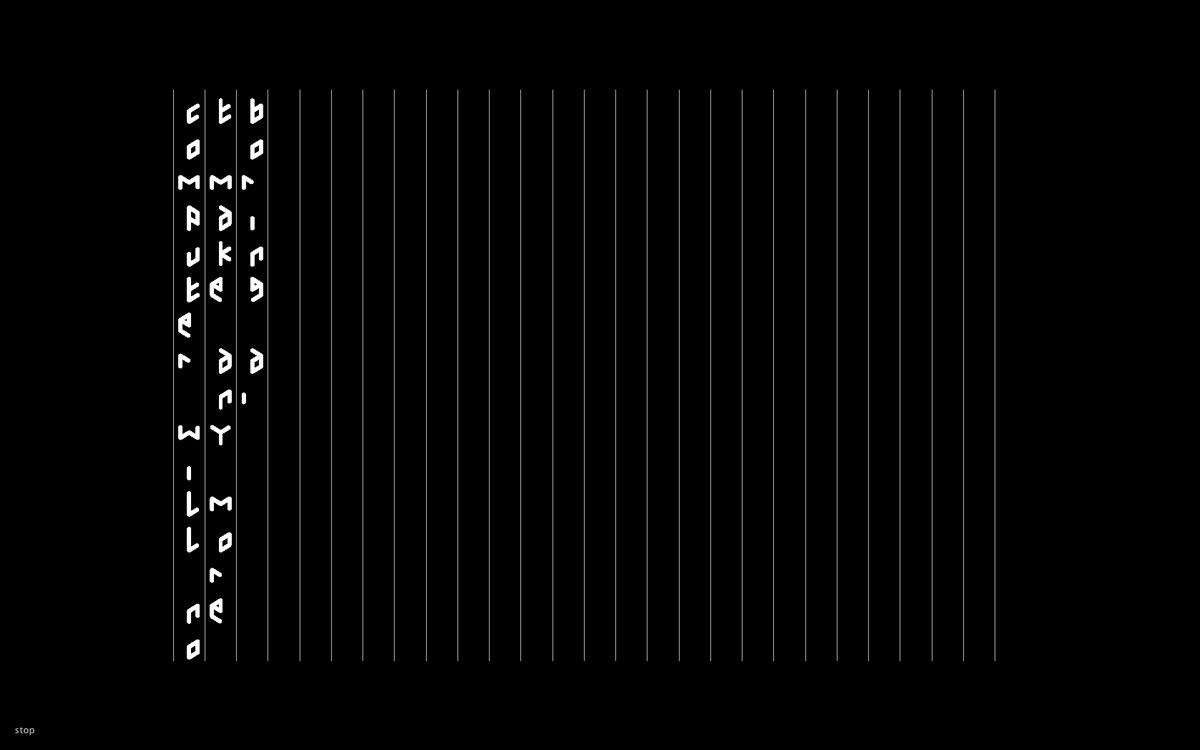Wenhua Shi at Squeaky Wheel
Philosopher Ludwig Wittgenstein, composer and champion of chance John Cage, and a few thousand years of Chinese culture seem to be guiding lights to the computer artist Wenhua Shi exhibit currently at Squeaky Wheel.
Computer games of a sort. But an unusual sort. More like some matters usually considered to be more serious than games, like language, and life. (Which are games of a sort, too.)
Usually with games—game games—we get to know—or can get to know—or think we can get to know—the rules of the game upfront. With language and life, it’s more problematic. Mostly we get to know the rules by playing the game.
Wenhua Shi’s games are more like language and life in that you learn as you go. That is, when you get to learn the rules at all. Some are more in a John Cagean mode. The basic rule seems to be randomness.
But lovely randomness. A work called After I Ching is not so much a game to play as an electronic artwork, electronic painting. A black panel with random-generated changing patterns of red LED lights, with I Ching divination hexagrams reference.
The best of the games to play, with rules you can learn—sort of—is called Fishing, Those Who Are Willing to Hook. Based on an old Chinese folk tale about a fisherman whose unusual technique is not to bait his hook nor actually immerse it in the water, but suspend it a foot or two above the water surface. A fisherman of a peculiarly meditational sort, it would seem, who prefers fishing to catching fish. (The tale has become proverbial regarding someone who does something—and keeps on doing it—regardless of disappointing results. Though as the folktale goes, the fisherman—his unusual technique—catches the eye of the local duke, who is impressed somehow, and makes him the overlord of his dukedom.)

Computer will not make any more boring art.
How you play the game is, there’s the fisherman in his boat on a video screen, and you hold your hand over a little sensor panel—not touching the panel, but somehow there’s an aura connection—and slowly—trial and error, hit and miss, by the tiniest hand movements—discover you can move the fisherman—by tiny increments—over a marked preferred fishing spot, and help him catch fish. (Or that seems to be the theory. I didn’t catch anything. But much patience and a steady hand required. Which would explain.)
Another game you play involves a microphone you sing or talk or emote into, which causes Chinese written characters and Western punctuation marks to burst onto and trickle down a huge computer screen, and activate a bar graph related to sound frequencies and dynamics. By rules you don’t get to fathom.
A game you don’t play but just watch is called Computer Will Not Make Any More Boring Art—a debatable proposition. A computer program writes that sentence—the title sentence—on a large screen, vertically, over and over, in letters that look a little like runes. Another game you don’t play but watch projects a rapid fire sequence of map contours on some irregular polygonal blocks that alternately might serve as seats to sit on and watch some of the other games in operation.
An accompanying booklet has helpful essays by new CEPA media arts curator Ekrem Serdar and artist and Wenhua Shi aficionado Evan Meaney, who talks about Wittgenstein’s idea about language as a game we learn and play communally.
Wenhua trained as a doctor in China but left the medical profession to work in radio and television in China, and then experimental film in the United States, with filmmakers Stan Brakhage and Phil Solomon at the University of Colorado, Boulder, then at the University of California, Berkeley, where he earned an MFA in Art Practice.
Wenhua will be at Squeaky Wheel on August 27 for a screening of another work or works, and to conduct a workshop on 3D video mapping. His exhibit is called A Year from Monday (a John Cage quote about an event that didn’t happen). It runs through September 3.
A Year From Monday
Squeaky Wheel Film & Media Art Center
617 Main St, Buffalo / (716) 884-7172 / squeaky.org

